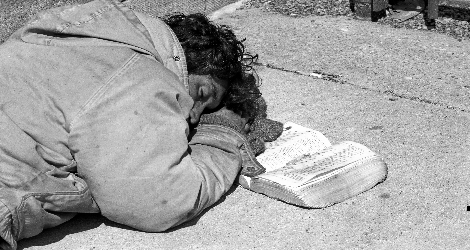The Early Church and Economic Life: Living in God’s House
The early followers of Jesus remembered his words and deeds. And, filled with the Holy Spirit, they did their best to live in ways that reflected the gospel of Jesus Christ. This included their economic lives: “All who believed were together and had all things in common; they would sell their possessions and goods and distribute the proceeds to all as any had need” (Acts 2:44). Furthermore,
the whole group of those who believed were of one heart and soul, and no one claimed private ownership of any possessions, but everything they owned was held in common…There was not a needy person among them, for as many as owned lands or houses sold them and brought the proceeds of what was sold. They laid it at the apostles’ feet, and it was distributed to each as any had need (Acts 4: 32-35).
The author of Acts makes clear that such sharing of possession was not only a consequence of following Jesus, but also a realization of the Old Testament covenant. In the midst of the Deuteronomic Code, with its laws about Sabbath and sabbatical, is the promise that “there will, however, be no one in need among you, because the Lord is sure to bless you…if only you will obey the Lord your God by diligently observing this entire commandment that I command you today” (Dt. 15:4-5).
As the church spread beyond Jerusalem and moved beyond its Jewish roots to include Gentiles, the Christian community continued to wrestle with the demands of the faith upon their economic lives and practices. In the midst of a decidedly hierarchical society, it is not surprising that some of the sensibilities of social standing and patronage began to seep into the practices of the Christian community.
Paul found himself challenging the Corinthian church to resist the corruption of their koinonia (fellowship) by the class and slave structures of the Roman Empire. The table fellowship of the Corinthian Christians was taking on the shape of a Roman banquet with its class divisions and patronage system. So Paul writes, “When you come together, it is not really to eat the Lord’s Supper” (I Cor. 11:20). For the rich eat well and the poor eat nothing—“one goes hungry and another becomes drunk” (I Cor. 11:21).
Paul advocates a covenantal understanding of their lives with its marks of dependence, independence, and interdependence. All depend completely on God for the gifts that they possess (I Cor. 12:4-7). A person’s abilities are not earned or deserved. They come as a gift from God and are no reason for pride or arrogance. Each person, moreover, has been entrusted with different gifts and abilities, each of which is significant and necessary to the well-being of the whole. These various gifts are not given for individual aggrandizement or personal profit but for the common good. They are entrusted to individuals but meant for the community—for the body of Christ.
Following Jesus in those early days placed Christians radically at odds with the assumptions and institutions of the world. In a context where family and clan radically conditioned a person’s identity, role, and prospects, Christians understood themselves as a new family—the family of God (Romans 8:12-17). In a society where Roman citizenship was an important marker of status and belonging, Christians identified themselves as citizens of heaven (Phillipians 3:20). In a world where economic life was embedded within the structures of the family and empire, Christian community sustained a robust critique of, and resistance to, their economic practices.








